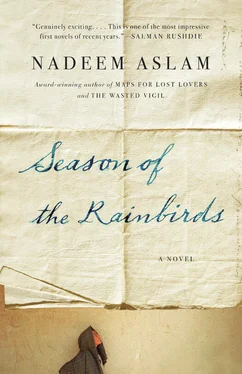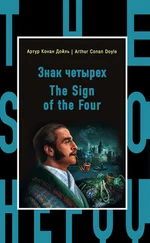‘No.’ The photographer took his hands out of the pockets. A piece of cottonwool was pressed to his forehead, held in place by two lengths of canvas tape that crossed each other at right angles. ‘Haven’t you heard about the attempt on the General’s life?’
Mr Kasmi gave a nod.
‘Saif’s gone into hiding for fear of arrest.’
Mr Kasmi started to walk. ‘Are you sure? Are you suggesting that he knew about it in advance.’
‘No.’ There was an edge to the photographer’s voice. ‘But there are bound to be repercussions. Anybody who has ever uttered a word against the regime is bound to be rounded up.’
‘Perhaps,’ said Mr Kasmi, ‘he got a telegram saying one of the children is ill.’
‘What telegram! There is no post office in this town.’
Mr Kasmi rounded his lips into an ‘ah’, remembering. ‘Does the hotel have a telephone?’
The photographer shook his head slowly. They had drawn level with the optician’s stall and began to cross the street. Sitting under the transparent canopy, the optician appeared to be engaged in a passionate discussion with the three men sitting with him on the bench. One of the men jabbed his finger furiously at the newspaper that lay folded in his lap and seemed to conclude his argument: ‘It’s a conspiracy!’
As Mr Kasmi and the photographer approached, all four men stood up respectfully to shake hands with the schoolteacher. ‘What can I do for you, Kasmi-sahib?’ asked the optician. The three men had remained standing.
‘I was just on my way to …’ Mr Kasmi pointed to the school-house fifty or so paces along the street. ‘But has any of you seen the journalist this morning?’
The men shook their heads. One of them turned to the photographer and asked, ‘Do you know anything about what happened last night?’
The photographer looked puzzled. ‘I heard about it on Indian radio this morning. I am as much in the dark as you. There’s nothing in the newspapers.’
‘It’s just international propaganda to weaken our country,’ one of the men said forcefully. He was close to shouting. ‘The General is a good man. Didn’t he say that his civil servants should spend ten out of every thirty days living amongst ordinary people? If they don’t obey him then it isn’t his fault.’
A mocking smile — almost a sneer — played on the lips of the man with the newspaper. ‘The man is an evil tyrant. Simple,’ he said. ‘Perhaps he should have gates put up at the ends of all the streets of the capital.’
The optician laughed. ‘How about moats around the presidential palace. Just like in the days of the Mogul emperors.’
The jeers caused the General’s supporter to shake his head in despair.
Mr Kasmi looked around. ‘So,’ he said quietly, ‘you haven’t seen him?’ The group became suddenly serious. One man murmured a ‘no’.
Mr Kasmi beckoned to the photographer and began to walk on. ‘You should see Azhar about using his telephone. Try to get in touch with the offices of your paper and ask if they know why your friend has left.’
‘I know why he’s left,’ the photographer grimaced.
Mr Kasmi nodded. ‘If that is so then he must be a very honest man. He will have gone to prison under every government in the past thirty years.’ At the end of the street they stopped. Mr Kasmi pointed along the side street and said, ‘Turn left there. It’s a small house with green doors and windows.’
The photographer took his handkerchief from his pocket and went down the street. Mr Kasmi too pressed his handkerchief to his nose. Fissures ran along the base of the school’s outside wall. The surfaces were uneven, and water lizards — and most of the stench, Mr Kasmi supposed — escaped through these openings. A few sections of the wall leaned at dangerous angles while others had collapsed completely.
‘Tarmac?’ said the headmaster.
Mr Kasmi had come to propose a solution to the problem of the proliferating water lizards and the stench. ‘Hot tarmac poured into the cracks will get rid of them.’
The headmaster heaved himself out of the chair and went to find the caretaker. Mr Kasmi looked around the office. On a shelf to the left of the headmaster’s chair were two tarnished sports trophies. Above them on the wall were many black-and-white photographs of groups of students and teachers. Mr Kasmi appeared in a few. Directly above the chair was a large portrait of the Founder. And on the third wall, nailed around the window, there were framed ink drawings of the ancient buildings that had housed the first Islamic universities. These universities in Baghdad, Jerusalem, Cairo, Alexandria were a source of great pride throughout the Muslim world, despite the knowledge that most of these cities were famous as centres of learning long before the rise of Islam. The window was fringed on the outside by a trailing vine whose orange, trumpet-shaped flower, with its distinct stigma and stamens, had proved an indispensable visual aid to the science teacher who structured the biology course in such a way that the section dealing with plant reproduction always coincided with April.
The headmaster returned, accompanied by the caretaker — a hunched, torpid creature who, according to generations of students, had one glass eye. ‘Nothing can be done till the rains stop,’ he told Mr Kasmi. ‘The boiling tarmac would have to be poured on dry earth. No use pouring it into mud.’ He was holding his left hand flat and plunged his other hand on to it to demonstrate the act of pouring.
After the caretaker left, Mr Kasmi said, ‘I suppose there’d be the same problem in trying to fill the holes with cement.’
The headmaster nodded. ‘Nothing can be done till next spring.’
Mr Kasmi looked out through the open door: the door to the classroom across the corridor was shut. ‘Not many students are attending school today, I suppose.’
‘No.’ The headmaster sat forward eagerly. ‘How is this country ever going to get ahead if a mere shower brings it to a standstill?’ He seemed to adopt, Mr Kasmi noticed, the attitude which he employed during the morning assembly. ‘It wouldn’t happen anywhere else in the world. People in other countries go to work despite the rains. Even in snow. Here shops are closed and people idle about at home.’
Mr Kasmi picked up his bag. He hesitated before he spoke. ‘It’s not as simple as that. If you have only one pair of shoes and can only afford one set of presentable clothes then it is advisable to stay at home during the rains and not get them muddied. Have you seen the state of the streets?’
‘Excuses, excuses, Kasmi-sahib.’
‘Things are changing, but it will take time. Remember the school at the beginning? Now it’s bigger and has more teachers. We have to be patient.’
‘No. If the school is bigger it’s because someone has worked for it. I went and stood at every door, asking for donations, ceiling fans, anything. It would not have expanded if, as you suggest, we had just waited.’
‘I didn’t suggest that,’ Mr Kasmi said, ‘I just think we should be tolerant.’ He was standing up.
A square packet stood on the floor by the headmaster’s desk. Part of its brown wrapper had been torn to reveal the contents: a row of identical books, each the size of an address book, no more than a few inches in length, and bound in a beautiful green.
The headmaster said, ‘Bad habits have to be criticised, Kasmi-sahib. Otherwise nothing will change.’ He registered Mr Kasmi’s glance at the packet of books and bent down to take one out through the opening in the wrapper. ‘They arrived on Monday. The parcel was one of the things in the lost mail-bag.’ He passed the book to Mr Kasmi.
‘The Little Green Book,’ Mr Kasmi read aloud the words embossed in goldleaf on the brow of the book. He opened it. It was a book commissioned by the country’s first chief martial-law administrator and contained ‘the President’s thoughts’. Copies of it had been sent to schools, mosques, cinema houses, hotels, roadside tea-stalls and, it was said at the time, to brothels.
Читать дальше












